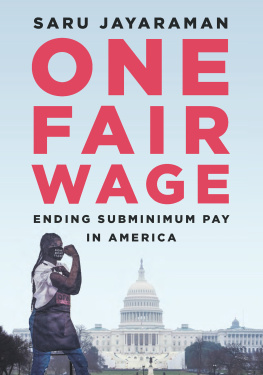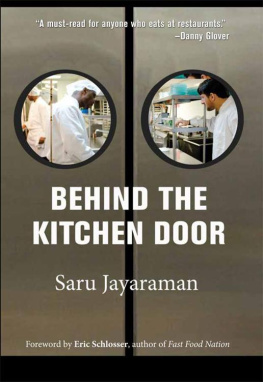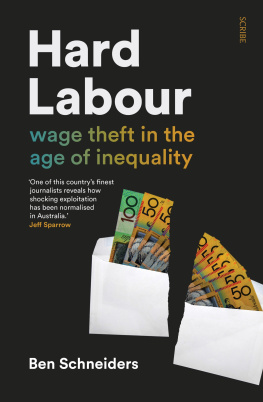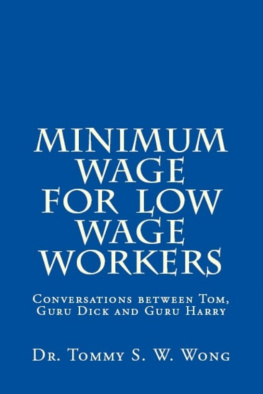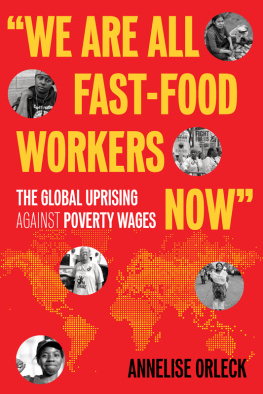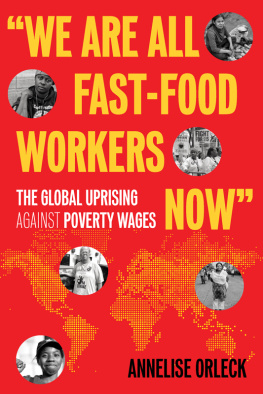ONE FAIR WAGE
ONE FAIR WAGE
ENDING SUBMINIMUM PAY IN AMERICA
SARU JAYARAMAN
Dedicated to service workers and all working people unjustly paid subminimum, subhuman wages, with the hope that all shall be valued as the skilled professionals that they are
Contents
2. Trupti: Serving with Sexual Harassment
Take off your mask so I know how much to tip you
3. Teto: Jim Crow Segregation for Tipped Workers
Once a busser, forever a busser
4. Dia and Adrinne: Parking and Airport Attendants for a Living Wage
A lot of people think our job is easy
5. Yenelia: Nail Salon Technicians Struggling to Get By
The customers dont say thank you, but they want perfection
6. Debbie and Marshan: Working While Incarcerated
Its literally slave labor
7. Vianne: Delivery Workers Seek Respect
You are not going to talk to me like this
8. Angel: Driving for the Subminimum
They give you very little as a company
9. Frances and Fiona: Workers with Disabilities and Youth Workers Want Equal Pay
We have a voice
Introduction
Jaime started working in Virginia Beach restaurants as a teenager. She worked at a sports bar earning $2.13 an hour plus tipsthe federal subminimum wage for tipped workers. As a Black person, she encountered countless acts of racism. They didnt want me to serve them; theyd request a different server. Sometimes they wouldnt ask for a different server, but they wouldnt want me to touch anything on their plate. If the kitchen made a mistake with the food, theyd assume it was because I was too dumb to get it right. As a woman, sexual harassment was the rule, not the exception. It was super common for the customers and the male staff to put their hands in your pocket, to grab you. If you didnt flirt with them, theyd complain to the manager, and then youd get in trouble. Then you get the sh*tty section, and youd have to go work somewhere else. Since we dont get paid an actual wage, we have to go somewhere you can get tips.
At one point, that somewhere else to get tips became New York City. Jaime put all her belongings in a U-Haul, drove up to New York, and lived in the truck until her first restaurant job brought in enough to allow her to get a place to live. When she landed a fine dining restaurant server position in midtown Manhattan, she was hopeful that she would not face the same kind of racism and sexual harassment she faced in Virginia, until one day her Southern general manager revealed it was no different in New York City. I was asking to switch shifts with another server, and he put his finger to his temple and said, I dont want to listen to your mammy whining. Jaime complained to Human Resources, which claimed to not know that the derogatory mammy term harkens back to slavery. The manager was never reprimanded in any way. Like so many other workers, Jaime moved on to another restaurant, continuously searching for a company that would respect her dignity and professionalism. All of that was before the pandemic.
After eight years of working as a server and bartender in New York City, Jaimes lifeand the life of everyone on the globewas upended by the COVID-19 pandemic. Laid off with the rest of her staff in March 2020, Jamie heard little from her employers until July, when she received a letter mandating that she return to work. There were no questions regarding COVID or whether she was sick or at risk, only that she must return or face termination of her unemployment insurance benefits.
Jaime had numerous concerns about going back to work, from fears about her health and safety to worries about how she would pay bills at a time when tips were so dramatically reduced, capacity was limited, and customers were still infrequent. She knew, however, that she did not have a real choice. If I could collect unemployment benefits and stay safe, I would. But we have to accept their terms of employment or lose unemployment benefits, says Jaime. This was especially true for tipped workers, who were lucky if they received unemployment insurance benefits; 60 percent reported experiencing great challenges accessing benefits because the state told them their wages were too low to meet the minimum threshold to qualify.
Jaimes restaurants reopening coincided with a surge in national uprisings for racial equity after the murder of George Floyd. As a Black woman, Jaime was frustrated and disheartened by the complete lack of care and communication on the part of her employer to address either the pandemic or rising calls for an end to anti-Black racism. As a server and bartender, this lack of care was compounded by the fact that her livelihood was completely dependent on pleasing customers at all costs to obtain tips. Within the first couple weeks of reopening, customers were starting to show severe resistance and hostility toward restaurant staff. In one instance, a customer refused to wear a mask despite being repeatedly asked by service staff. One of Jaimes coworkers was forced to de-escalate the situation and the irate customer eventually left. As he was leaving, the customer yelled that the service staff represented what was wrong with America, and that if he wanted to risk his life that was his choice. He expressly stated that he would be voting for Trump come November.
This incident was not Jaimes first encounter with coded racism and harassment on the part of customers or management in the restaurant industry. For tipped workers like Jaime, the customer is always right; the customer pays your bills, not the employer, and as a result, the customers biases dictate a workers livelihood. In fact, Black women in restaurant dining earn $8 less an hour than their white men counterparts in New York because they earn less in tipsboth because they are segregated into more casual restaurants, where tips are smaller, and because even in fine dining restaurants, customer bias results in workers of color earning less in tips. Jaime has seen coworkers fired over racist Yelp reviews left by customers.
Thousands of Jaimes peers have reported that hostility and harassment toward tipped workers dramatically increased during the pandemic, even as these same workers were being asked to do more for less. Suddenly tipped workers were being asked to enforce social distancing and mask rulesserving as public health marshals in highly dangerous settingswhen workers reported tips were down 50 to 75 percent. Worst of all, thousands of Jaimes peers have reported that sexual harassment increased during the pandemic. Hundreds of women have reported that male customers asked them to remove their masks so that they could judge their looks and determine their tips on that basis. The phenomenon became so prevalent that it earned its own hashtag: #MaskualHarassment.
During the pandemic, restaurant workers became one of the only essential workers to not receive a full minimum wage, and the only essential workers to be asked to remove their protective gear for the chance to earn their income.
Jaime is not sure she will stay in the restaurant industry. I take pride in the education and knowledge Ive gained over the last fifteen years. Not everyone can be a fine dining server. The only thing that makes me not want to be in this industry is the way Im treated at work and treated by guests. If I were given actual paid time off and benefits like other professionalsif I were given a living wage, it would be so much different. We get paid because of our smiles, intellect, and charm. The state does not require our employer to pay us thats the sh*tty part of the industry. Its paid my rent and bills, put me through school, but Ive worked really hard, and Ive been put in compromising positions on lots of occasions. I shouldnt have had men put hands in my pocket or ask me what Im doing after work, or if I can work in their home. I should be protected from that.

